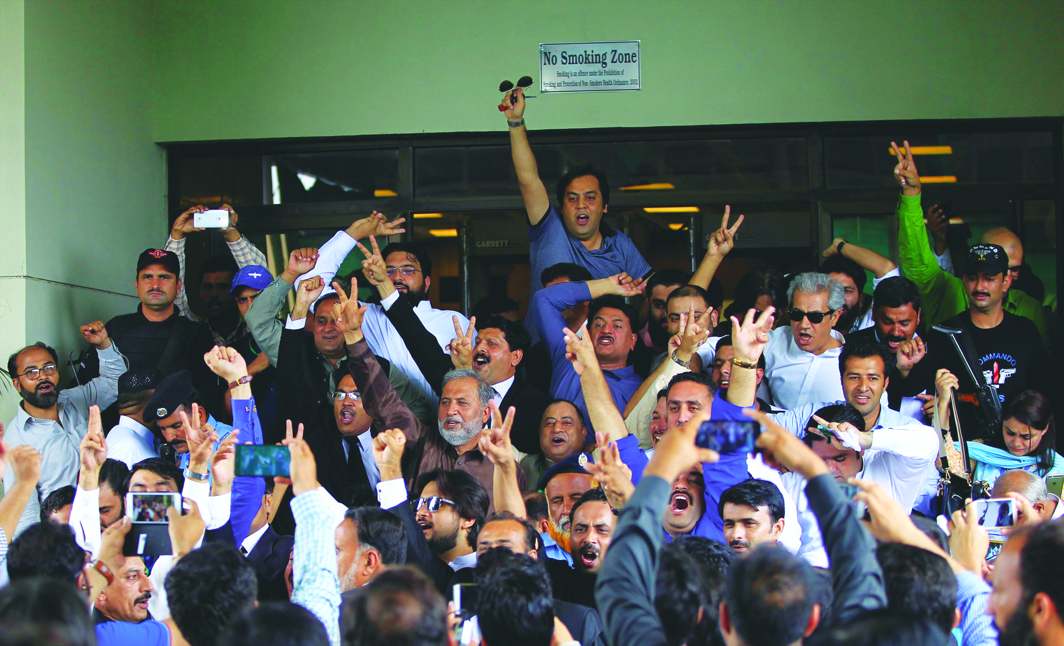Above: Nawaz Sharif has been barred from holding public office for life. Photo: UNI
Five judges of the Supreme Court disqualify Pakistan PM Nawaz Sharif from office over undeclared assets and the Panama Papers which link his children to offshore companies
Nawaz Sharif resigned as prime minister of Pakistan on July 28 after five judges of the Pakistan’s Supreme Court unanimously disqualified him from holding public office for life over corruption. This involved money laundering and establishing offshore assets and companies and which were revealed in the Panama Papers.
His brother, Punjab chief minister Shahbaz Sharif, has taken over till elections, which are scheduled in 2018. Shahbaz, of course, will have to get elected as a member of the National Assembly in due course of time.
No Pakistani prime minister has ever completed a full term in office since its formation in 1947. In fact, Sharif has been three times unlucky. He served as PM from November 1990 to July 1993 and from February 1997 until he was toppled in a coup in October 1999. The Supreme Court had wielded its axe on Pakistan’s 21st prime minister, Yousaf Raza Gillani, when he was retroactively disqualified and ousted by the court on April 26, 2012.
The reaction of legal eagles in India was of euphoria. Not because of the politics involved, but because of the bold action of the judiciary in a practically failed state. Justice NP Chapalgaonkar, former judge of the Bombay High Court, told India Legal: “Some sections of the media in Pakistan said it was a black day for Pakistan. I think the fact that Sharif had to resign made it a memorable day for Pakistani jurisprudence as well as governance. Such an incident, where constitutional and moral probity were held high, is a welcome thing. There are lessons in this for all of South and South East Asia. We, in India, can learn from it too. One needs to understand that corruption in governance and in public polity cannot be tolerated.”

The hearings in Sharif’s case were spread over nearly 15 months and were often marred by controversy. This was a criminal case and the Supreme Court, an appellate body, had initially refused to hear it. But later, it not only admitted the petition, but started its own probe into the case.
Leading Pakistani newspaper Dawn said: “Justice Ejaz Afzal Khan, who had headed the apex court’s implementation bench following its April 20 order on the Panama Papers case, announced that the larger bench had unanimously deemed Sharif unfit for holding office and would also order an accountability court to open references against him and his family.”
The court has ordered the case against Sharif to be referred to the National Accountability Bureau, said Justice Khan. That will continue as a criminal case, looking into the massive corruption charges levelled against him. The charges against Sharif include money laundering to buy assets in London in the 1990s. The 2016 Panama Papers leak revealed that the assets were being managed through offshore companies owned by Sharif’s children.
The court took pro-active steps and asked the Election Commission of Pakistan (ECP) to denotify the PM to fulfil the technicalities of implementing the order. The court order said that the ECP should deseat the PM for not disclosing his role in the Dubai-based Capital FZE Company in his nomination papers.
“Such an incident, where constitutional and moral probity were held high, is a welcome thing. There are lessons in this for all of South and South East Asia. We, in India, can learn from it too.”
—Justice NP Chapalgaonkar, former judge of the Bombay High Court
It is not clear how this development would affect India’s relations with Pakistan. Tensions have remained high between the two countries with continual cross-border firings and terrorist infiltrations. Fears of another army takeover of the country were not unfounded and that could totally alter, even harm, the negotiations that have taken place so far.
The official Indian reaction so far has been cautious, with the government refraining from commenting on the ouster of Sharif. Delhi, though, “is keeping a close watch”, was the official version. It may be recalled that the personal equation between Prime Minister Narendra Modi and Sharif kept going despite skirmishes across the border.
Justice Chapalgaonkar also said that there was the fear of yet another Army coup, quite common in Pakistan. “That would be dangerous for India and the relationship between the two countries. Considering that, I think it was good that Sharif’s brother took over quickly, keeping the nation’s governance in civilian hands,” he said.
He said the sanctity of judicial action and its observations “can be an example for us” in dealing with the many corrupt elements in Indian politics. While he did not directly refer to anybody, the immediate reference could be the break-up of the Bihar government. In this case, RJD chief Lalu Prasad Yadav had insisted that his son, Tejashwi Yadav, would not demit the office of deputy CM despite being implicated in a disproportionate assets case by the CBI.
Whatever is the future of Pakistani politics, its judiciary has been hailed.
—By India Legal Bureau


